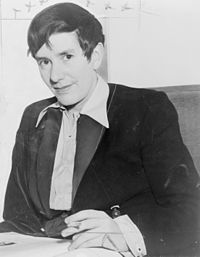Erika Mann
| Erika Mann | |
|---|---|

Erika Mann c. 1938
|
|
| Born |
Erika Julia Hedwig Mann November 9, 1905 Munich, German Empire |
| Died |
August 27, 1969 (aged 63) Zürich, Switzerland |
| Occupation | Writer, war correspondent, actress |
| Spouse(s) |
Gustaf Gründgens (m. 1926–29) W. H. Auden (m. 1935–69) |
| Notes | |
|
Daughter of Thomas Mann and Katia Mann
|
|
Erika Julia Hedwig Mann (November 9, 1905 – August 27, 1969) was a German actress and writer, the eldest daughter of novelist Thomas Mann and Katia Mann.
Erika Mann was born in Munich, the firstborn daughter of writer and later Nobel-prize winner Thomas Mann and his wife, Katia (née Pringsheim), the daughter of an intellectual German family of Jewish heritage. She was named after Katia Mann's brother Erik, who died early, Thomas Mann's sister , and her grandmother Hedwig Dohm. She was baptized Protestant, just as her mother had been.
Thomas Mann expressed in a letter to his brother Heinrich Mann his disappointment about the birth of his first child:
Nevertheless, he later candidly confessed in the notes of his diary, that he "preferred, of the six, the two oldest [Erika and Klaus] and little Elisabeth with a strange decisiveness".
In Erika he had a particular trust, which later showed itself in that she exercised a great influence on the important decisions of her father. Her particular role was also known by her siblings, as her brother Golo Mann remembered: "Little Erika must salt the soup". This reference to the twelve-year-old Erika from the year 1917 was an often-used phrase in the Mann family.
After Erika's birth came that of her brother Klaus, with whom she was personally close her entire life. They went about "like twins", and Klaus Mann described their closeness as follows: "our solidarity was absolute and without reservation". Eventually there were four more children in total, including Golo, Monika, Elisabeth, and Michael. The children grew up in Munich. On the mother's side the family belonged to the influential urban upper class, and the father came from a commercial family from Lübeck and already had published the successful novel Buddenbrooks in 1901.
The Mann home was a gathering-place for intellectuals and artists, and Erika was hired for her first theater engagement before finishing her Abitur at the Deutsches Theater in Berlin.
...
Wikipedia
